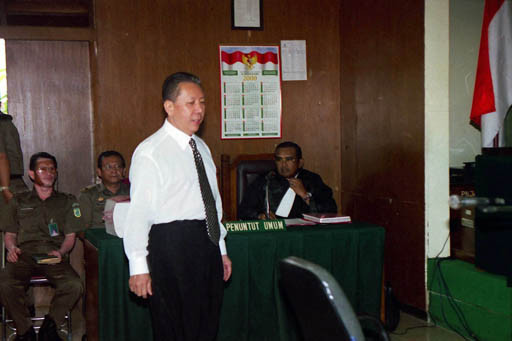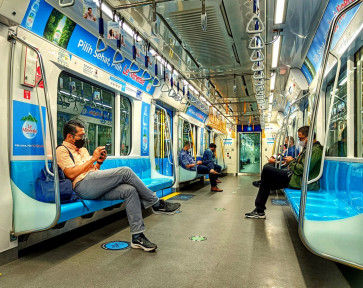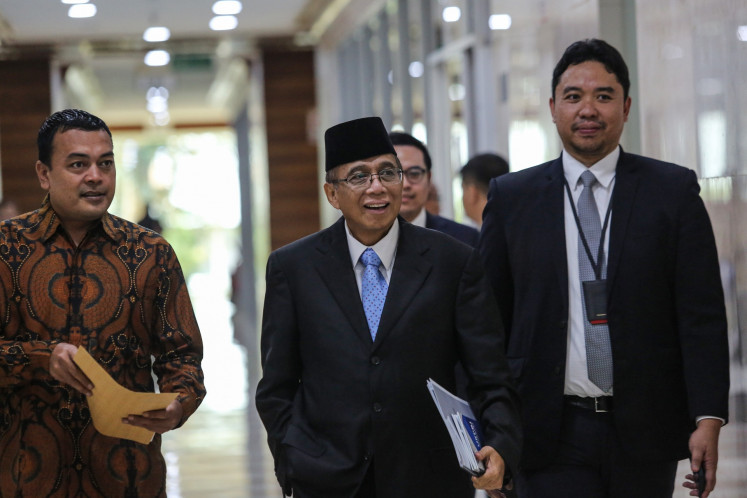Popular Reads
Top Results
Can't find what you're looking for?
View all search resultsPopular Reads
Top Results
Can't find what you're looking for?
View all search resultsFugitives exploit lax immigration system
Authorities were unable to detect the return of graft convict and decade-long fugitive Djoko Soegiarto Tjandra. Activists worry that others will exploit the same holes in enforcement.
Change text size
Gift Premium Articles
to Anyone
I
mmigration authorities have once again found themselves under scrutiny after failing to detect the arrival of high-profile graft convict and fugitive Djoko Soegiarto Tjandra, who is believed to have returned to Indonesia after spending about 10 years overseas.
Antigraft activists warned that other convicts could make use of holes in the immigration system to escape or reenter the country and avoid prosecution.
Djoko was involved in the Bank Bali scandal, which saw hundreds of billions of rupiah embezzled from state bailout funds for the 1998 Asian financial crisis. He was acquitted in 2000 but later convicted in 2009 after the Attorney General’s Office (AGO) filed a request for review.
Djoko fled the country to Papua New Guinea on June 10, 2009, a day before the Supreme Court issued its ruling. Indonesian authorities learned that Djoko had reentered the country only after the AGO discovered he had filed an appeal in early June for a review of his case. His lawyer Andi Putra Kusuma later confirmed that Djoko had been present at the South Jakarta District Court on June 8 to file the documents.
Djoko's whereabouts since have remained unclear. He has skipped his court hearings, and critics have wondered aloud why authorities have failed to find him.
“I’m just worried that the weak immigration monitoring system will motivate other graft criminals to escape the country,” said Zaenur Rohman, a researcher at the Gadjah Mada University Center for Anticorruption Studies (Pukat UGM).
“Not only was Djoko able to flee undetected [in 2009], he also managed to return to the country without being noticed by immigration. That should be a wake-up call for immigration [authorities] to realize that their monitoring system is weak,” he said.
Read also: Fugitive Djoko Tjandra skips another court hearing, claims to be in Malaysia
He urged immigration authorities to audit the information and technology systems at all border checkpoints to prevent other fugitives from eluding law enforcement, noting that Djoko was not the first to slip through the authorities’ net.
Immigration officers were unable to detect the arrival of graft suspect Harun Masiku, a former Indonesian Democratic Party of Struggle (PDI-P) member who had been declared a person of interest by the Corruption Eradication Commission (KPK). He arrived in Jakarta from Singapore on Jan. 7. The officers cited delayed immigration data transmission.
Immigration authorities initially said that Harun, who had been accused of bribing former General Elections Commission (KPU) commissioner Wahyu Setiawan in an alleged attempt to secure a spot as a lawmaker, was not in Indonesia when the KPK named him as a suspect in the case on Jan. 8. But two weeks later, immigration authorities clarified the statement, saying that Harun had indeed returned to Indonesia on Jan 7. In response, Ronny Sompie was dismissed from his post as immigration director general at the Law and Human Rights Ministry. Harun’s whereabouts remain unclear.
Read also: Immigration, KPK under fire over Harun escape
In 2010, immigration authorities were accused of issuing a passport with a false identity to graft defendant Gayus Tambunan, who was being detained in a high-security prison, that allowed him to travel briefly overseas. The passport was used to enter Singapore, Kuala Lumpur and Macau in 2010.
Indonesian Anticorruption Community (MAKI) coordinator Boyamin Saiman said a poor immigration system would prevent law enforcement agencies from investigating graft cases. MAKI reported the immigration authorities to the Indonesian Ombudsman on Tuesday for their failure to detect Djoko, hoping the public service monitoring agency would pinpoint the flaws in the immigration system so that they could be addressed.
Lawmaker Sarifuddin Sudding of the National Mandate Party (PAN) said, “This shows the weak system and poor coordination between ministries and institutions, which makes it very easy for a fugitive to enter and exit our country.”
Read also: Immigration issued Gayus passport to travel abroad
Attorney General ST Burhanuddin criticized immigration authorities for failing to notify his office of Djoko’s arrival, but he said investigators were continuing to search for Djoko.
Immigration Directorate General spokesman Arvin Gumilang and the ministry’s spokesman Pagar Butarbutar were not immediately available for comment.
Law and Human Rights Minister Yasonna Laoly denied accusations that immigration authorities had been negligent in Djoko’s case. Yasonna said the AGO had not requested an extension of Djoko’s travel ban after 2012 and that Djoko had also been removed from Interpol’s red notice list in 2014, implying that law enforcement worldwide had stopped searching for him.
But it was only on May 13 of this year that domestic immigration authorities removed Djoko from their most-wanted list, before adding his name back to the list on June 27 following a request from the AGO.
Djoko’s lawyer Andi insisted that Djoko "was, in fact, not a fugitive when returning to Indonesia".
-- Ghina Ghaliya contributed to this story.










